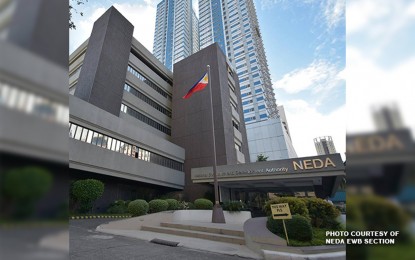[9.6] 표적 보조금, 글로벌 인플레이션 압력 완화를 위한 농업
컨텐츠 정보
- 17,175 조회
본문
마닐라 – 국가경제개발청(NEDA)은 정부의 보조금 프로그램과 국가의 농업 및 식품 시스템을 변화시켜 글로벌 인플레이션 압력의 영향을 완화하고 필리핀인의 구매력을 보호하기 위한 개입을 강조합니다.
필리핀 통계청은 2022년 8월 필리핀의 물가상승률이 전월의 6.4%에서 6.3%로 소폭 완화됐다고 화요일 발표했다.
이것은 Bangko Sentral ng Pilipinas의 월간 예측 범위인 5.9~6.7% 내에 있는 반면 현재까지 인플레이션은 4.9%까지 상승했습니다.
“국가와 국가 간에 회복이 고르지 않아 공급망이 매우 비효율적입니다. 이는 시장이 수요와 공급 사이의 새로운 균형을 찾기 위해 전환함에 따라 일시적일 것으로 예상됩니다. 장기화된 러시아-우크라이나 전쟁과 국가의 기상 장애, 특히 라니냐로 상황은 더욱 악화됩니다. NEDA 장관인 "Arsenio Balisacan"은 성명에서 "이는 즉시 지원이 필요한 농업 부문의 낮은 생산성을 확대하는 역할을 합니다."라고 말했습니다.
“필리핀 가정, 특히 사회의 가난한 사람들이 충분히 건강에 좋은 음식을 식탁에 올릴 수 있도록 하는 것이 우리의 최우선 과제입니다. 우리는 인플레이션을 낮추고 소비자의 구매력을 보호하기 위해 운송 및 물류 비용을 줄이는 프로그램을 계속 시행할 것입니다. 가장 중요한 것은 필리핀 농업을 역동적이고 생산적인 부문으로 전환하여 우리의 회복을 가속화하고 국가의 빈곤을 크게 줄이는 것이 필수적입니다."라고 "Balisacan"이 덧붙였습니다.
이 나라에서 식품 및 무알코올 음료의 인플레이션은 육류, 생선 및 야채의 느린 인플레이션으로 부분적으로 상쇄되었습니다.
이는 현지 돼지고기 생산 개선 및 돼지고기 적시 수입품 도착을 포함하여 정부가 다양한 개입을 했기 때문입니다.
정부는 국내 공급을 늘리기 위해 투입 비용 절감, 농업 혁신, 농민에 대한 재정 지원 확대, 농업 가치 사슬 강화를 통해 농업 부문을 계속 지원할 것입니다.
“단기적으로는 회복 모멘텀을 강화하는 동시에 국가에서 가장 취약한 부문이 지원되도록 해야 합니다. 동시에, 특히 농업에서 생산성을 개선하고 소비자와 생산자 사이에서 회복력을 구축하기 위한 중기 솔루션에 투자해야 합니다.”라고 Balisacan이 말했습니다.
주요 경제의 둔화와 기타 지정학적 위험으로 인해 글로벌 석유 전망은 여전히 불확실합니다.높은 유가의 영향을 완화하기 위해 정부는 농민과 어민에게 연료 할인을 제공하고 있습니다.
158,000명 이상의 적격 농민과 어민이 연료 가격 인상의 영향을 완화하는 데 도움이 되는 연료 할인으로 각각 3,000페소를 받게 됩니다.
2022년 8월 17일 현재 전국적으로 총 131,145개의 대상 수혜자 계정이 생성되었으며 이 중 120,827개의 계정에 이미 연료 할인이 적용되었으며 42,084개의 카드가 이미 전국의 옥수수 농가와 어민에게 배포되었습니다.
또한, 예산 관리부는 연말까지 EDSA 버스 캐러셀의 모든 승객을 위한 무료 승차 프로그램의 연장을 지원하기 위해 14억 페소의 추가 기금의 해제를 승인했습니다.
이것은 노동자와 대면 학교 교육을 받는 학생을 포함하여 최대 5천만 명의 라이더를 지원할 것입니다.
“정부는 필리핀인들이 더 높은 생활비에 대처할 수 있도록 신속하고 단호한 조치를 취하기 위해 최선을 다하고 있습니다. 이것은 목표 보조금을 제공하고 국제 유가 상승에도 불구하고 상품과 서비스의 원활한 공급을 보장함으로써 이루어집니다." "Balisacan"이 말했습니다. (홍보)
This is the Original Article from PNA NEWS
[9.6] Targeted subsidies, agri to ease global inflationary pressures
MANILA – The National Economic and Development Authority (NEDA) highlights the government’s subsidy programs and its interventions to transform the country’s farming and food systems to ease the impact of global inflationary pressures and protect the purchasing power of Filipinos.
The Philippine Statistics Authority reported on Tuesday that the country’s inflation rate eased slightly to 6.3 percent in August 2022 from 6.4 percent in the previous month.
This is within the Bangko Sentral ng Pilipinas’ forecast range of 5.9 to 6.7 percent for the month, while year-to-date inflation picked up to 4.9 percent.
“Recovery is uneven within countries and across countries, and this results in very inefficient supply chains. This is expected to be temporary as markets transition to find the new balance between supply and demand. The situation is made worse by the protracted Russia-Ukraine war, and the country’s weather disturbances particularly La Niña. These serve to magnify the low productivity in our agricultural sector, which needs to be supported immediately,” NEDA Secretary "Arsenio Balisacan" said in a statement.
“It is our top priority to ensure that Filipino households have sufficient and healthy food on their table, especially the poorer sector of the society. We will continue implementing programs that reduce transport and logistics costs to bring inflation down and protect the purchasing power of our consumers. Most importantly, it is imperative to transform Philippine agriculture into a dynamic and productive sector to speed up our recovery and significantly reduce poverty in the country,” "Balisacan" added.
In the country, inflation of food and non-alcoholic beverages was partly offset by the slower inflation of meat, fish, and vegetables.
This is due to the various interventions put in place by the government, including improvements in local pork production and timely import arrival of pork.
To boost domestic supply, the government will continue to support the agriculture sector through lower input costs, innovation in farming, an extension of financial assistance to farmers, and boosting the agricultural value chain.
“In the short-term, we need to boost our recovery momentum, while we make sure that the most disadvantaged sectors of the country are assisted. Simultaneously, we need to invest in medium-term solutions to improve productivity, especially in agriculture, and build resilience among consumers and producers,” Balisacan said.
The global oil outlook remains uncertain amid the slowdown in major economies and other geopolitical risks. To temper the effect of the high fuel prices, the government is providing fuel discounts to farmers and fisherfolk.
More than 158,000 eligible farmers and fisherfolk are each set to receive 3,000 pesos as fuel discounts to help cushion the impact of higher fuel prices.
As of Aug. 17, 2022, a total of 131,145 accounts for target beneficiaries have been created nationwide, 120,827 accounts of which were already loaded with fuel discounts and 42,084 cards have already been distributed to corn farmers and fisherfolk nationwide.
Furthermore, the Department of Budget and Management has approved the release of 1.4 billion pesos additional funds to support the extension of the Free Rides Program for all the passengers of the EDSA bus carousel until year-end.
This will support up to 50 million riders, including workers as well as students who are back to face-to-face schooling.
“The government remains committed to taking swift and decisive action to ensure Filipinos can cope with the higher cost of living. This is done by providing targeted subsidies and ensuring an unhampered supply of goods and services despite the rising global oil prices,” "Balisacan," said. (PR)
관련자료
-
이전
-
다음


